|
Page < 1 2 3 4 5 6 7 8 9 10 11 12 13 14 15 16 17 18 19 20 21 22 23 24 25 >
Show
in alphabetical orde
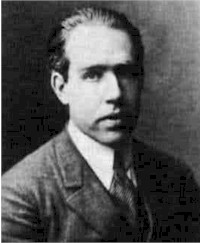 141. Niels Henrik David Bohr, (1885-1962)
Danish
nuclear physicist who developed the Bohr model of the atom.
His
received
the Nobel Prize in physics in
1922, for his
theory
of atomic structure (Quantum
Theory). 141. Niels Henrik David Bohr, (1885-1962)
Danish
nuclear physicist who developed the Bohr model of the atom.
His
received
the Nobel Prize in physics in
1922, for his
theory
of atomic structure (Quantum
Theory).
He
is on
record as saying that he goes into the Upanishads to ask questions.
(source: From article - Indian
Conquests of the Mind - By Saibal Gupta.
The Statesman.org)
142. John
Archibald Wheeler,
(1911 - ) physicist,
the first American involved in the theoretical development of the atomic bomb.
He also originated a novel approach to the unified field
theory.
He
has worked with such famous physicists as: Einstein, Thorne,
Oppenheimer,
Bohr,
etc.
Professor Emeritus at Princeton and Texas universities, studied with Niels Bohr, was named winner of the
1997 Wolf Prize in Physics, for developing the modern "black hole"
theory. Has taught students include scientists like Richard Feynman, now occupies
the chair that was held by Einstein.
 Wheeler
wrote: “I like to think that someone will trace how the
deepest thinking of India made its way to Greece and from there to the
philosophy of our times.”
Wheeler
wrote: “I like to think that someone will trace how the
deepest thinking of India made its way to Greece and from there to the
philosophy of our times.”
It is curious that people like
Schroedinger, Niels Bohr, Oppenheimer and John
Wheeler are Upanishad
scholars.
(source: From article - Indian
Conquests of the Mind - By Saibal Gupta. The Statesman.org).
“One has the feeling that the thinkers of the East knew it
all, and if we could only translate their answers into our language we would
have the answers to all our questions.”
(source: Uncommon
Wisdom - By Fritjof Capra p. 40).
143.
Lin Yutang
(1895-1976) Chinese scholar and author of the book, The Wisdom of China and India,
writes:
"Hindus are natural
mystics, mysticism meaning a form of religion aiming at achieving direct union
with God. To achieve the union of the individual soul (atman) with the world
soul (brahman) behind all things may be said to be the whole effort of the Vedic
philosophy."
He further writes:
"My
love and true respect for India was born when I first read the Indian epics, the
Ramayana and the Mahabharata
in the present translation in my college days. In these two masterpieces we are
brought closer to the atmosphere, ideals and customs of ancient Hindu life than
by a hundred volumes of commentary on the Upanishads, and through them Hindu
ideals, as well as Hindu men and women, become real to us. And the fact that
Hindu imagination produced such masterpieces of literature, closely rivaling
Homer in antiquity and in beauty and power of portraying human passions, is
definite pledge of the worth and richness of the Hindu civilization."
 "The creative imagination
of the Hindus has conceived no loftier and holier character than Sita; the
literature of the world has not produced a higher ideal of womanly love, womanly
truth, and womanly devotion." "The creative imagination
of the Hindus has conceived no loftier and holier character than Sita; the
literature of the world has not produced a higher ideal of womanly love, womanly
truth, and womanly devotion."
"The contact with poets, forest saints and the
best wits of the land, the glimpse into the first awakening of Ancient India's
mind as it searched, at times childishly and naively, at times with a deep
intuition, but at all times earnestly and passionately, for the spiritual truths
and the meaning of existence - this experience must be highly stimulating to
anyone, particularly because the Hindu culture is so different and therefore so
much to offer." "Not until we see the richness of the Hindu mind and its
essential spirituality can we understand India...."
"India was China's teacher in religion and
imaginative literature, and the world's teacher in trignometry, quandratic
equations, grammar, phonetics, Arabian Nights, animal fables, chess, as well as
in philosophy, and that she inspired Boccaccio, Goethe, Herder, Schopenhauer,
Emerson, and probably also old Aesop."
"India produced too much religion and China too little." A
trickle of Indian religious spirit overflowed to China and inundated the whole
of Eastern Asia. It would seem logical and appropriate that any one suffering
from a deficiency of the religious spirit should turn to India rather than to
any other country in the world."
It is apparent that only in India is
religion still a living emotion.
India is the home of
fables...one must say that the Hindu mind is fabulous. The genius for creating
fables seems inexhaustible in Indian literature....Ernest
Rhys, in his Introduction
to Fable, Aesop and Others justly remarks, "We have to admit that the
beast-fable did not begin with him (Aesop), or in Greece at all. We have, in
fact, to go East and to look to India and burrow in the 'tale of tales' of Hitopadesa
to get an idea how old the antiquity of the fable actually is. When one
remembers also that many of the stories in the Arabian Nights, including that of
the famous Sindbad the Sailor, are of
Hindu origin, it is not easy to accept the
view that such tales are not of native Indian growth."
The Indian culture is highly
creative and in fact has enriched the world literature with the droll
humor that we associate with the Arabian Nights.
(source: The
Wisdom of China and India - By Lin Yutang
p. 3-4 and 135 -141 and 265-7).
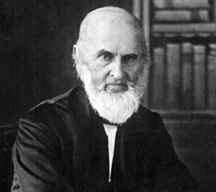 144.
John Greenleaf Whittier
(1807-1892) was a talented poet who was
influenced by Emerson and from whom he borrowed a copy of the Bhagavad Gita.
To Emerson he wrote: "I will e'en keep it until I restore it to thee
personally in exchange for George Fox (founder of the Society of Friends, the
Quakers). "It is a wonderful book-and has greatly
excited my curiosity to know more of the religious literature of the East." 144.
John Greenleaf Whittier
(1807-1892) was a talented poet who was
influenced by Emerson and from whom he borrowed a copy of the Bhagavad Gita.
To Emerson he wrote: "I will e'en keep it until I restore it to thee
personally in exchange for George Fox (founder of the Society of Friends, the
Quakers). "It is a wonderful book-and has greatly
excited my curiosity to know more of the religious literature of the East."
(source: The Oriental Religions and
American Thought (Nineteenth-Century Explorations), Carl T. Jackson -  Greenwood
Press, London, England, 1981, p. 80.) Greenwood
Press, London, England, 1981, p. 80.)
The results of Whittier's reading are evident in a good
number of his poems like "The Oval Heart," "The Cypress Tree of
Ceylon," "The Dead Feast of the Kol-Folk," and "The Khan's
Devil." A particularly striking example of his use of Indian material is
his well-known poem "The Brewing of Soma," which describes the
preparation and use of the Vedic sacrificial drink (source: www.gosai.com
)
145.
Maurice Winternitz
(1863-1937) famed Indologist, author of History
of Indian Literature, states:
" From the mystical
doctrines of the Upanishads, one current of thought may be traced to the
mysticism of Persian Sufism, to the mystic, theosophic logos doctrine of the
Neo-Platonics and the Alexandrian Christian Mystics, Eckhart and Tauler, and
finally to the philosophy of the great German mystic of the nineteenth century,
Schopenhauer."
(source: History of Indian
Literature - By Maurice
Winternitz
volume 1.
p. 266).
 Professor Winternitz, remarks in his Indian
Literature and World Literature: Professor Winternitz, remarks in his Indian
Literature and World Literature:
“Garbe, the greatest authority on Samkhya Philosophy in
Europe, has made it very probable that Samkhya Philosophy has been of influence
on the philosophical ideas of Heraklitos, Empedokles, Anxagoras, Demokritos and
Epikuros…It seems to me to be proved the Pythagoras
was influenced by the Indian Samkhya. Nor have I any doubt that the Gnostic and
Neo-Platonic philosophies have been influenced by Indian philosophical ideas.”
(source: Manu:
A Study in Hindu Social Theory - By Kewal Motwani
p. 230).
“For
the history of the literary treasures of ancient India, appears to us only as
part and parcel of the history of man. In this sense, Indian literature is as
much ours as it is yours. The ideas and thoughts of great men belong to mankind,
and not to any one country or nation only.”
(source: Some
Problems of Indian Literature - By Maurice Winternitz).
146. M. A.
Sherring, noted missionary of the 19th century,
eloquently described
the antiquity of Varanasi, in the following words:
“When
Babylon was struggling with Nineveh for supremacy, when Tyre was planting her
colonies, when Athens was growing in strength, before Rome had become known,
or Greece had contended with Persia, or Cyprus had added lustre to the Persian
monarchy, or Nebuchadnezzar had captured Jerusalem, and the inhabitants of
Judaea had been carried into captivity, she (Varanasi) had already risen to
greatness, if not to glory.”
 (source:
Banaras
- City of Light - By Diana L. Eck
p. 4-5). (source:
Banaras
- City of Light - By Diana L. Eck
p. 4-5).
147. H.
Stutfield
author of Mysticism and Catholicism
states:
"Especially does there seem to be a growing probability that, from the
historical standpoint at any rate,
India was the birthplace of our fundamental
imaginings, the cradle of contemplative religion and the nobler philosophy."
(source:
Mysticism and
Catholicism - By H Stutfield 1925 p. 31).
148. F.
W. J. Schelling
(1773-1854) a crucial figure in the development of German idealist and nature
philosophy, Eastern ideas pervade and color much of his thinking. In his book Philosophy
of Mythology, he devoted to India more than one
hundred pages. He regarded Vedanta as an 'exalted idealism'
and this
enthusiasm for Indian thought was taken up by Arthur Schopenhauer.
(source: An
Introduction to Hinduism - By Gavin Flood
p. 269).
Through out his life Schelling
expressed great interest in and support for Indian studies, and in his 1802
lecture he lavished praise on the 'sacred texts of the Indians, claiming that
they were superior to the Bible.
(source: Oriental
Enlightenment: The encounter between Asian and Western
thought - By J. J. Clarke
p. 61-63).
 149.
Robert
Southey (1774-1843), English poet, generally
considered a member of the romantic movement. He was born in Bristol and
educated at the University of Oxford. Southey
was a good friend of poet Samuel Taylor Cole ridge. 149.
Robert
Southey (1774-1843), English poet, generally
considered a member of the romantic movement. He was born in Bristol and
educated at the University of Oxford. Southey
was a good friend of poet Samuel Taylor Cole ridge.
He had read the Bhagavad Gita in the preparation of his
lurid narrative poem The Curse of Kehama written
in 1810.
Southey's verse is among the
first in English to incorporate Hindu mythology into verse, so that in The Curse
of Kehama we find references:
A stream descends on Meru
mountain
None hath seen its secret fountain;
It had its birth, so Sages say,
Upon the memorable day
When Parvati presumed to lay
In wanton play,
her hands, too venturous Goddess, in her mirth,
On Seeva's eyes, the light and life of Earth...
Thereat the heart of the Universe stood still...
And Ganges thence upon the world descended,
The Holy River, the Redeeming Flood.
(source:
British Attitudes to India, 1784-1858 -
By Bearce
(Oxford 1961) p. 103 and
The Curse of Kehama - By
Robert Southey).
150. K.
P. Mukherji ( ? )
has observed: "The essential point which Westerners and Westernized Indians
have to bear in mind, is that the Hindu Culture
is through through synthetic, it aims at the synthesis of the here and
hereafter, the world and the other world, the appearance that is many and the
reality that is one, the temporal and the eternal, the positive and the
transcendental."
(source: Ancient
Indian History and Culture - By Chidambara Kulkarni
Orient Longman Ltd. 1974. p. 266).
151. F. W.
Thomas, in
The Legacy of India,
says:
"What gives
to the Upanishads their unique quality and unfailing human appeal is an earnest
sincerity of tone, as of friends conferring upon matters of deep concern."
He wrote in his book
The
Mutual Influence of Mohammedans and Hindus,
"Hinduism is one of the greatest assimilants that the world has
known." "It is infinitely absorbent like the ocean."
(source: The
Discovery of India - By Jawaharlal Nehru
p. 90 and The
Mutual Influence of Mohammedans and Hindus - by F W Thomas).
 152. Deepak Chopra
Vedantic sage and wise-man from the East, author of several books including Ageless Body, Timeless
Mind says of Hinduism: 152. Deepak Chopra
Vedantic sage and wise-man from the East, author of several books including Ageless Body, Timeless
Mind says of Hinduism:
"I find that Vedanta, of all great traditions, does have a framework that
I can come to terms with as a person who thinks that science is the most
legitimate way of understanding the secrets of nature."
" I regard
Vedanta as a source which inspired Hinduism." He emphasizes the Bhagavad
Gita, as one of the gemstones of the Vedantic traditions.
(source: Deepak
Chopra: Vedantic Evangelist - Hinduism Today July/August 2000).
 153.
Sir Jacob Epstein (1880-1959),
leading English Sculptor. After studying with Rodin in Paris, he revolted
against the ornate and pretty in art, producing bold, often harsh and massive
forms in stone and bronze. His best-known pieces include the Oscar Wilde
Memorial (1911; Père-Lachaise, Paris), a marble Venus (1917;
Yale Univ., New
Haven, Conn.), and a Madonna and Child (Convent of the Holy Child Jesus,
London). 153.
Sir Jacob Epstein (1880-1959),
leading English Sculptor. After studying with Rodin in Paris, he revolted
against the ornate and pretty in art, producing bold, often harsh and massive
forms in stone and bronze. His best-known pieces include the Oscar Wilde
Memorial (1911; Père-Lachaise, Paris), a marble Venus (1917;
Yale Univ., New
Haven, Conn.), and a Madonna and Child (Convent of the Holy Child Jesus,
London).
Epstein has written about
Shiva Nataraja:
"Shiva
dances, creating the world and destroying it, his large rhythms conjure up vast
aeons of time, and his movements have a relentless magical power of incantation.
Our European allegories are banal and pointless by comparison with these
profound works, devoid of the trappings of symbolism, concentrating on the
essential, the essentially plastic."
(source: Let
There Be Sculpture - By Sir Jacob Epstein
1942 p. 193).
154. Apollonius
Tyanaeus,
Greek Thinker and Traveler. 1st Century AD,
said:
"In India I found a race of mortals living upon the Earth. but not adhering to
it. Inhabiting cities, but not being fixed to them, possessing everything but
possessed by nothing."
155. Mr. Thorton,
in his book History of British India,
observed:
"the Hindus are indisputably entitled to rank
among the most ancient of existing nations, as well as among those most early
and most rapidly civilized ...ere yet the Pyramids looked down upon the Valley
of the Nile.. when Greece and Italy, those cradles of modern civilization,
housed only the tenants of the wilderness,
India was the seat of wealth and
grandeur.."
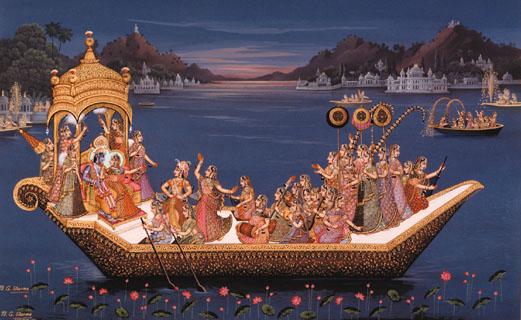
For
more refer to chapter on Greater
India: Suvarnabhumi and Sacred
Angkor
(image
source: Hinduism
Today).
***
156 Professor Eugene Burnouf (1801-1852)
in his
Discourse
on Sanskrit and Its Literature, given at the
College of France, states:
" We will study India with its philosophy and its myths, its literature,
its laws and its language. Nay it is more than India, it is a page of the origin
of the world that we will attempt to decipher."
(source:
Discourse
on Sanskrit and Its Literature - By Eugene Burnouf).
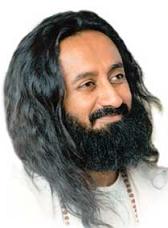 157.
Sri Sri Ravi
Shankar ( ?) founder of the Bangalore based Art
of Living an International Foundation. He
recently addressed the UN Peace Summit on Aug 28. He is the only non-westerner
to serve on the advisory board of Yale
University's School of Divinity and is
author of the book - Hinduism and
Christianity . 157.
Sri Sri Ravi
Shankar ( ?) founder of the Bangalore based Art
of Living an International Foundation. He
recently addressed the UN Peace Summit on Aug 28. He is the only non-westerner
to serve on the advisory board of Yale
University's School of Divinity and is
author of the book - Hinduism and
Christianity .
"Hinduism is not a religion; it is just a
way of life that thousands of Rishis have written about. It
is such a democratic religion where everybody has the freedom to think, write or
say whatever they want. We have no opposition for any other philosophy coming
into us. We have no opposition for the Bible to be part of our own
study. Nobody here will say, 'If you read the Bible, you will go to hell'. It is
an inclusive way of looking at life, and that is what we need in the world
today. We have no objection taking food from every part of the world, listening
to music from every part of the world. So we need to globalize wisdom too."
(source: Re-establish
The Human Values, Globalize The Knowledge).
He explains that Hindu astrology has a very ancient
lineage. Ten thousand years ago the Rig-Veda saw the earth as round and the sun
was at the center and all the planets revolved around it. The West is thus
committing an injustice by not giving Indian astronomy and astrology due
credit.
"Indian astronomers had calculated that life
started 1 billion, 955 million, 818 thousand and 501 years ago and that 28
cycles of yugas have already happened."
"The ancient sages knew these facts. This is why
they devised the mala (necklace) with 108 beads, which stand for the 12 constellations and the nine planets and the 108 different permutations which
affect one's life." Everything is this universe is interconnected."
(source: It
was all in our stars - By Francois Gautier - Indian Express
October 23, 2000).
For more on Sri Sri Ravi Shankar
refer to chapter on Glimpses
XI.
 158.
Hu Shih
(1891-1962), Chinese philosopher in Republican China. He promoted vernacular
literature to replace writing in the classical style. He was ambassador to the
U.S. (1938-42) and chancellor of Peking University (1946-48).
Hu
Shih
has commented on the peace-loving nature of Indians: 158.
Hu Shih
(1891-1962), Chinese philosopher in Republican China. He promoted vernacular
literature to replace writing in the classical style. He was ambassador to the
U.S. (1938-42) and chancellor of Peking University (1946-48).
Hu
Shih
has commented on the peace-loving nature of Indians:
"India conquered and dominated China culturally for 20 centuries without ever
having to send a single soldier across her border."
"Never
before had China seen a religion so rich in imagery, so beautiful and
captivating in ritualism and so bold in cosmological and metaphysical
speculations. Like a poor beggar suddenly halting before a magnificent
storehouse of precious stones of dazzling brilliancy and splendor, China was
overwhelmed, baffled and overjoyed. She begged and borrowed freely from this
munificent giver. The first borrowings were chiefly from the religious life of
India, in which China's indebtedness to India can never be fully told."
(source:
India
and World Civilization - By D. P. Singhal p. 338).
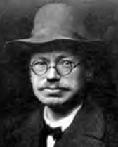 159. Professor
Vere Gordon Childe (1892 -1957) one of
archeology's few very great synthesizers writes: 159. Professor
Vere Gordon Childe (1892 -1957) one of
archeology's few very great synthesizers writes:
"It would be absurd to suggest that any
two tribes living, say, in Greece and India, and speaking quite unconnected
dialects, on reaching the same level of development should have hit upon such
similar words for "father," "fall," and "five" and
inflected them in such similar ways as the Vedic Indians and the Homeric Greeks
did in fact do.
The primitive culture must be the stage of development reached
by several peoples while living sufficiently close together to
communicate."
(source: The European
Inheritance 1: 84).
 160.
Frederich von
Schlegel (1772-1829), German philosopher, critic, and writer,
the most prominent founder of German Romanticism. Educated in law, he turned to
writing. His brother, August Wilhelm von Schlegel,
was a scholar and poet. With his brother, August Wilhelm, he published the
Athenaeum, the principal organ of the romantic school. He was so impressed with
Indic spirituality that he declared: 160.
Frederich von
Schlegel (1772-1829), German philosopher, critic, and writer,
the most prominent founder of German Romanticism. Educated in law, he turned to
writing. His brother, August Wilhelm von Schlegel,
was a scholar and poet. With his brother, August Wilhelm, he published the
Athenaeum, the principal organ of the romantic school. He was so impressed with
Indic spirituality that he declared:
" When one considers the
sublime disposition underlying the truly universal education (of
traditional India)...then what is or has been called
religion in Europe seems to us to be scarcely deserving of that name.
And one feels compelled to advise those who wish to witness religion to travel
to India for that purpose...."
(source:
In
Search of The Cradle of Civilization: : New Light on Ancient India - By
Georg Feuerstein, Subhash Kak & David Frawley
p. 276).
“The Indians possessed a knowledge
of the true God, conceived and expressed in noble, clear and grand
language…Even the loftiest philosophy of the Europeans, the idealization of
reason, as set forth by the Greeks, appears in comparison with the abundant
light and vigor of oriental idealism, like a feeble spark in the full flood of
the noonday sun.”
(source: Hinduism Invades America -
By Wendell Thomas p. 239 published by The Beacon Press Inc. New York
City 1930).
Schlegel
study of Sanskrit and of Indian civilization, On
the Language and Wisdom of India (1808),
was outstanding.
He said that, " There
is no language in the world, even Greek, which has the clarity and the
philosophical precision of Sanskrit," adding that:
" India is not only
at the origin of everything she is superior in everything, intellectually,
religiously or politically and even the Greek heritage seems pale in
comparison."
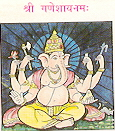 (source: Arise,
O India - By Francois Gautier ISBN
81-241-0518-9 Har-Anand Publications 2000. p. 25
). (source: Arise,
O India - By Francois Gautier ISBN
81-241-0518-9 Har-Anand Publications 2000. p. 25
).
He wrote to his friend and comrade, the poet Ludwig
Tieck (1773-1853): "Here is the actual
source of all languages, all the thoughts and poems of the human spirit;
everything, everything without exception comes from India."
(source: On
Hinduism Reviews and Reflections - By Ram Swarup p. 105 and The
Aryan Hoax: That Dupes The Indians - By Paramesh Choudhary
p. 109).
Schelegel speaks of the noble,
clear and severely grand accents of Indian thought. He wrote in his book, Indian
Languages, Literature and Philosophy, p. 471:
"The divine origin of man, as taught by
Vedanta, is continually inculcated, to stimulate his efforts to return, to
animate him in the struggle, and incite him to consider a reunion and
reincorporation with Divinity as the one primary object of every action and
reaction. Even the loftiest philosophy of the European, the idealism of reason
as it is set forth by the Greek philosophers, appears in comparison with the
abundant light and vigor of Oriental idealism like a feeble Promethean spark in
the full flood of heavenly glory of the noonday sun, faltering and feeble and
ever ready to be extinguished."
(source: India
And Her People - By Swami Abhedananda - p.23-24).
 Schegel spoke for his generation when he wrote
that: Schegel spoke for his generation when he wrote
that:
"In India lay the real source of all
tongues, of all thoughts and utterances of the human mind. Everything - yes,
everything without exception - has it origin in India." and "The
primary source of all intellectual development - in a word the whole human
culture - is unquestionably to be found in the traditions of the
East."
(source: Oriental
Enlightenment: The encounter between Asian and Western thought - By J. J.
Clarke p.65).
"India is pre-eminently
distinguished for the many traits of original grandeur of thought and of the
wonderful remains of immediate knowledge."
"The doctrine of the
transmigration of souls was indigenous to India and was brought into Greece by
Pythagoras."
"Even the loftiest
philosophy of the Europeans, the idealism of reason, as is set forth by Greek
philosophers, appears in comparison with the abundant light and vigor of
Oriental idealism like a
feeble promethean spark
in the full flood of heavenly glory of the noonday sun - faltering and feeble
and ever ready to be extinguished."
(source: Lectures on the history
of literature: ancient
and modern p. 126
and Hindu
Superiority
- By Har Bilas Sarda
p. 276 - 280).

Top of Page
Show
in alphabetical order
Quotes161_180.htm

Page < 1 2 3 4 5 6 7 8 9 10 11 12 13 14 15 16 17 18 19 20 21 22 23 24 >
|